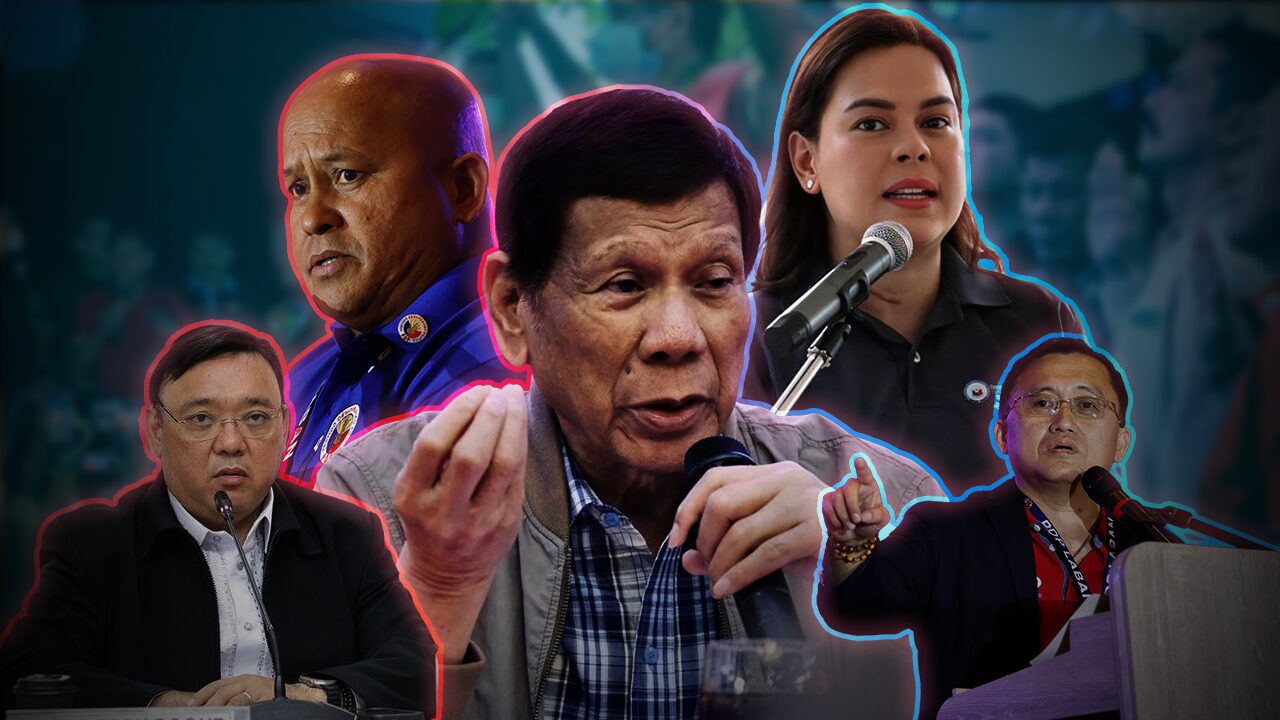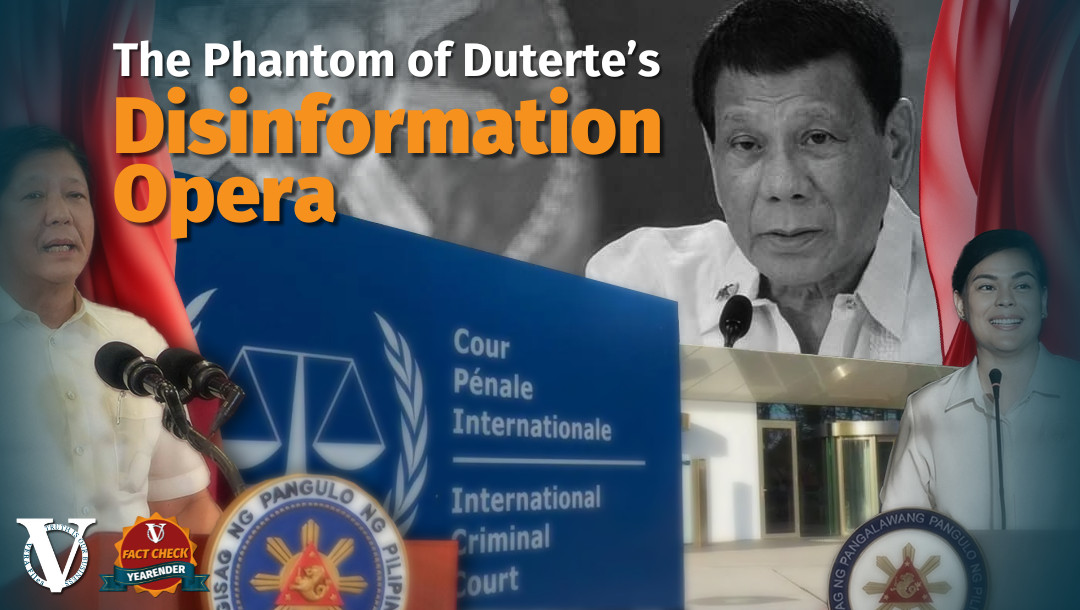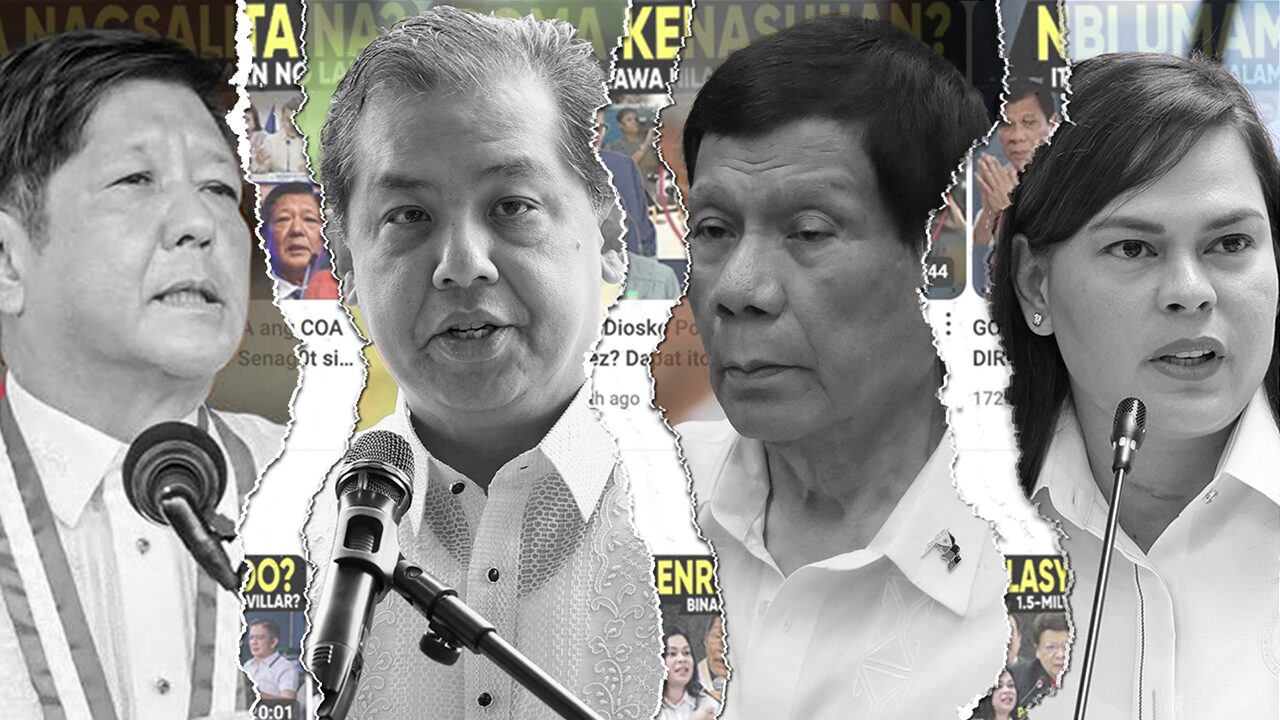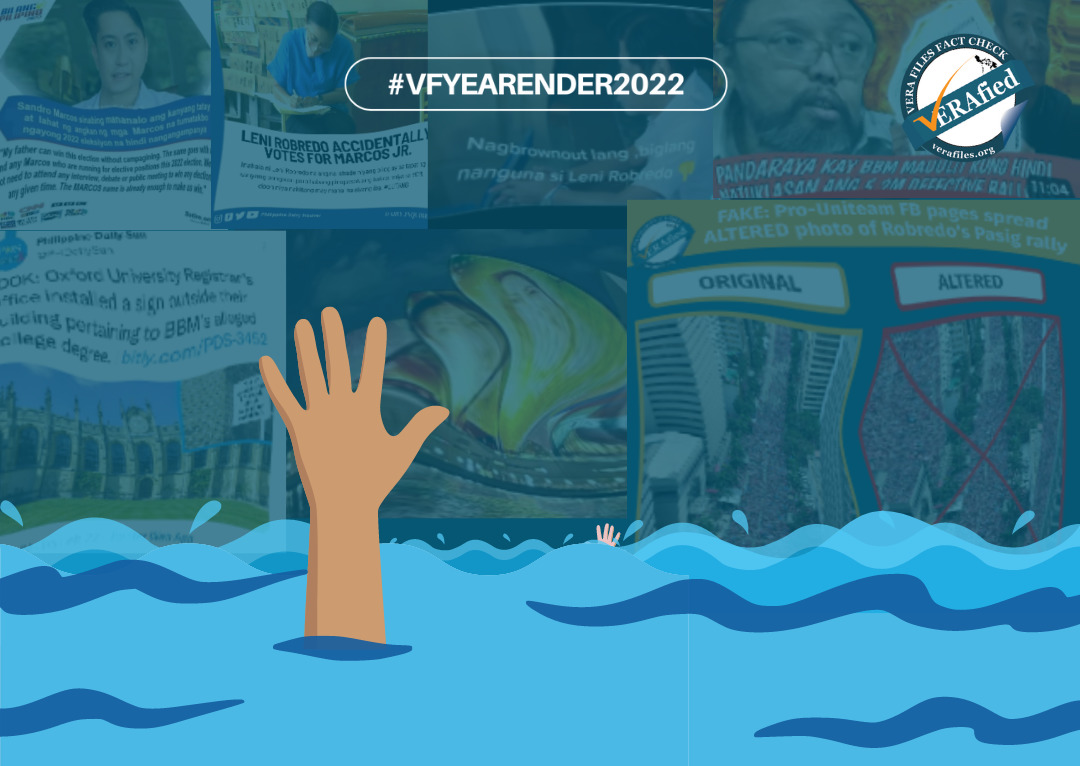Two years after leaving office in 2022, former president Rodrigo Duterte teetered between having no qualms about supporting his successor President Ferdinand Marcos Jr. and opposing the administration.
Tensions between the previous and present presidents on certain policies marked 2024. Marcos is cracking down on Philippine offshore gaming operators (POGOs) that his predecessor legalized. Administration allies in the House of Representatives formed a quad committee to investigate controversies involving Duterte’s bloody drug war as well as the possible connection of POGOs to Chinese-led syndicates in the country.
Read Pro-Duterte accounts flood YouTube with rage-bait disinformation amid UniTeam split
In the course of extricating himself from questionable policies and transactions during his presidency, Duterte spared nothing in disparaging the Marcos camp—notably contradicting his own statements.
Of the 92 claims by public figures fact-checked by VERA Files this year, 28 (30.44%) came from Duterte. Additionally, 17 of his claims were flip-flops on key issues such as Charter change, drug-related extra-judicial killings and his political support for Marcos
VERA Files took a deeper look into Duterte’s rhetoric to check if this makes his camp the legitimate or genuine “opposition” to the current administration.
Duterte’s dizzying stances
Almost two-thirds of Duterte’s 28 claims fact-checked by VERA Files this year were flip-flops where the former president switched stances on issues concerning himself.
His other claims had him spouting false and baseless accusations in support of his pushback against Marcos and his administration.
Sixteen of Duterte’s claims were made in January to May 2024. Many of these statements were from his speeches at the Hakbang ng Maisug caravan organized by his allies.
Hakbang ng Maisug, a mix of Tagalog and Cebuano translating to “march of the brave,” is a series of “prayer rallies” that gathered a few thousands of Duterte supporters initially to oppose the proposed revision of the 1987 Constitution led by members of the House of Representatives.
The first rally was held on Jan. 28 in Davao City prompted by Councilor Conrado Baluran who, in a privilege speech, blasted the House-backed people’s initiative (PI). Those who signed the PI petitions were allegedly enticed with money and other forms of assistance.
Duterte himself had pushed for Charter change to shift to federalism during his presidency. The sudden change of heart against constitutional revision was only one of many tone shifts he let slip at these protest rallies.
The gatherings served as a venue to lambast Marcos and his administration, including a call for the president’s resignation for alleged incompetence and weak leadership.
Duterte made the claims mostly at public events, with a noticeable drop in his media appearances this year when he was forced to stop hosting his weekly talk show Gikan sa Masa, Para sa Masa on Sonshine Media Network International (SMNI). The network was initially suspended for 30 days by the National Telecommunications Commission (NTC) in December 2023 for violating the terms of its franchise. In January 2024, NTC extended the suspension indefinitely.
Meta also took down the network’s Facebook page in June, but SMNI still maintains its website and YouTube channel.
After a period of silence, Duterte made waves again in October.
He attended a Senate Blue Ribbon subcommittee hearing on Oct. 28 to answer questions on extra-judicial killings in the course of implementing his campaign against illegal drugs. There, he initially denied the existence of the Davao Death Squad only to admit later that the vigilante group that supposedly carried out executions did roam the city when he was mayor.
He also said repeatedly that he was taking “full legal responsibility” for his actions in the implementation of the drug war during his presidency but took it back later. He did the same teetering when he showed up on Nov. 13 before the House quad committee.
Aside from contradicting his own claims of accountability for drug-related killings, Duterte also fibbed about his wealth when dared to sign a waiver on the confidentiality of his bank accounts.
“Itong pag-flip-flop niya (His flip-flopping)… still gains the attention of the public. It’s a performance for Duterte. It speaks to a certain kind of audience that still yearns for that macho-populist rhetoric that Duterte has and has practiced for a long time,” said University of the Philippines (UP) speech communication professor Charles Ladia.
The narrative around Duterte’s rhetoric is also propped up by his allies, who echoed and elaborated on his conflicting claims throughout the past year.
When the former president began insulting Marcos, Duterte’s spiritual adviser Apollo Quiboloy, his former spokesperson Harry Roque and son, Davao City Mayor Sebastian, similarly withdrew their support for Marcos. Quiboloy and Roque currently face scrutiny by the administration for suspected criminal activities.
Other allies such as Sen. Ronald “Bato” Dela Rosa, Sen. Bong Go, former broadcaster Jay Sonza and his daughter, Vice President Sara—herself also under investigation by the House for her alleged anomalous spending of confidential funds—have shared false and misleading claims in defense of the older Duterte’s views.
Dutertes as the new opposition?
UP political science professor Maria Ela Atienza said that the Duterte camp’s habit of seesawing on its statements was a way to secure trust from supporters.
“[Their flip-flopping] shows that all [of Duterte’s] actuations in the past are not actually based on a particular principle. It’s just that he wants to go against anything that the Marcos admin is doing,” she said.” .
In the past year, Duterte repeatedly contradicted himself regarding his status as an opposition to the current administration.
The opposition label did not come only from the mouth of the former president but also from his allies.
On June 19, the same day Vice President Sara Duterte stepped down as Education secretary, Roque turned to social media and claimed that the younger Duterte was the new “leader of the opposition” and that the “UniTeam has formally been dissolved.”
But who can actually be considered as political opposition? According to Atienza, there is an assumption that “genuine” opposition political parties are differentiated from “administration” parties based on their ideologies, political programs and preferred policy proposals.
Another assumption, Atienza added, is that there is “party discipline” or stability of numbers where there are no politicians “jumping ships.”
She said this is rarely observed in the Philippines due to the multi-party system, making it difficult to determine who is genuinely part of the opposition and who is pro-administration.
“Many people change political parties or alliances because part of the expectation is that if you’re supporting the administration or the party of the president… you get additional funds,” she explained.
Ladia, on the other hand, emphasized the important role of the opposition as the “guard” for transparency and accountability in the country. It’s the role of the political opposition to rise and be vocal about whatever wrong or dubious the administration is doing, he said.
Both Atienza and Ladia pointed out that the Dutertes’ opposition branding merely reflects the split of the Marcos-Duterte tandem established during the 2022 presidential campaign.
“It’s basically opposition not in terms of political parties or party ideologies. It’s more of opposition based on personalities and political families and supporters; they’re fighting each other,” Atienza said.
“In the process, by declaring the Dutertes and pro-Duterte people or Duterte supporters as the opposition, they are actually hijacking the position that should be going to the more progressive sectors,” she added.
In a May 31 interview on VERA Files’ Tres from Tress podcast, former two-term senator Antonio Trillanes IV called the Duterte camp a ‘de facto opposition’ only out to grab power.
The Liberal Party and Makabayan bloc also previously rejected claims that Sara Duterte is the new opposition leader.
“Nakita ko ‘yung goal na ginagamit nila ‘yung political opposition as a name para ma-distance nila or ma-dissolve nila ‘yung sinasabi nilang UniTeam,” Ladia said.
(I see their goal of using political opposition as a name to distance themselves and dissolve what they called UniTeam.)
Ladia, whose expertise involves political rhetoric, also found it interesting that the Duterte camp calls itself “opposition” after the former president vocally antagonized and attacked opposition figures during his administration.
“Parang, ‘pag political opposition ka… kalaban ka ng administrasyon, kalaban ka ng bansa, at merong red-tagging aspect pa d’yan, ‘di ba? Makikita natin na ngayon, ‘yung flip-flopping [nila], is also a part of ano ka ba talaga? Political opposition ka ba talaga?” he explained.
This, he added, can be why the Dutertes could not entirely commit to the branding of a political opposition. Instead, they use it as a “rhetorical” and “coalitional” strategy to call on everyone against the administration to band together.
Ladia explained this kind of rhetoric from the Duterte camp will most definitely be used in the upcoming 2025 elections. However, the “genuineness” of that opposition can only be determined after the polls.
“Ano talaga ‘yung political opposition (What really is political opposition)? Are you going to be silent about the administration’s programs and policies? Or ikaw mismo ‘yung mag-check and balance (Will you do the check and balance)? Ikaw mismo ‘yung mag-criticize sa (Will you criticize the) administration?” he pointed out.
Leading up to next year’s polls, however, a highly public battle in the Marcos-backed House will continue to run the Dutertes through the wringer before the 19th Congress ends its session. The administration’s decision to cooperate with the International Criminal Court on the elder Duterte’s case also hangs in the balance
“Even after the 2022 elections, nandiyan lang [si Duterte] palagi (Duterte has always just been there). People would wait for [the former president] to speak. And whatever he speaks, magiging laman nito ang flip-flopping (we can count on his statements to be full of flip-flopping),” Ladia said.






